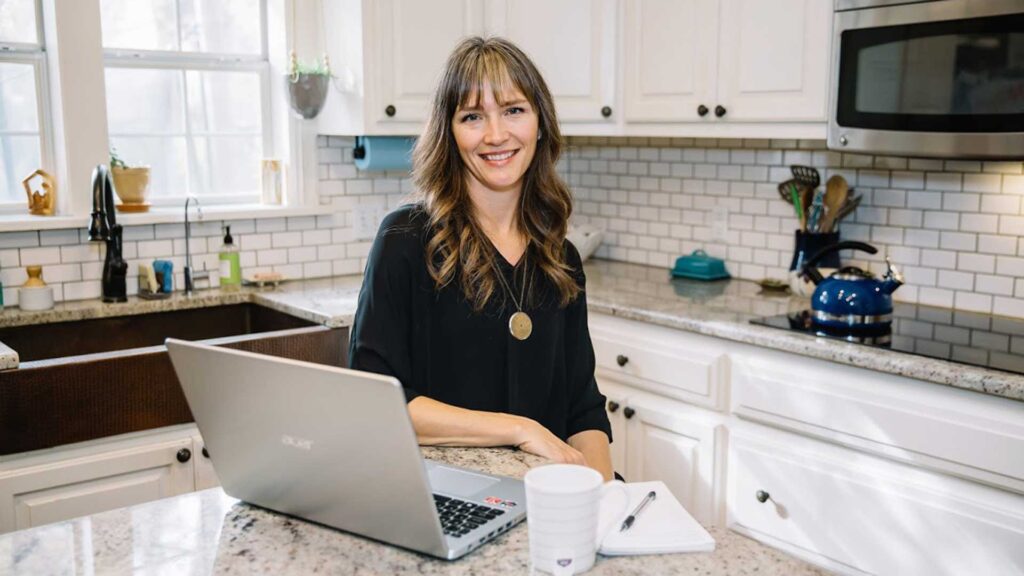Why do I care about creating a care plan for anxiety?
Each practitioner has a reason for doing what they do.
I just felt a calling to become a dietitian. I fought it for years because I had heard the nutrition program in college was hard. So I didn’t choose that major until the middle of my junior year. When I finally gave in, I knew I was in the right spot.
Fast forward a few years as I was working in a hospital as a clinical dietitian in the morning and as the only dietitian in the cardiac rehab in the afternoon. I really loved what I did but every afternoon I would be about doubled over in tummy pain, gas and bloating.
After failed attempts at getting answers from traditional medicine doctors and taking unneeded medication, I decided to take matters into my own hands. I started noticing a pattern that the symptoms came on only in the afternoon and wouldn’t happen on the weekends.
It finally hit me, I’ve got anxiety!
I got to work, came up with a plan, implemented the plan, stuck to the plan, and the anxiety became manageable. Soon I didn’t even think about the anxiety anymore because I no longer had the tummy problems.
Until… I had three kids, a household to run, a private practice, and life was crazy. Some days I felt like I looked five months pregnant, I had gas, and the pain was unbearable. But it was only sometimes. I had a hard time putting my finger on it but I then remembered how I dealt with anxiety in the past and realized that was what was going on again. I implemented my care plan for anxiety, with a few more changes, and again, the symptoms started disappearing.
In my private practice at the time, I was helping women only with diet changes. They were improving but I never could help them quite as much as I wanted to. Most of the women I saw suffered from anxiety and many were taking medication for anxiety. It was crazy to me that so many women suffer from anxiety! I wanted to give them my plan… so I did.
And guess what! It worked for them too!
So, let’s dive into why it’s important to create a care plan for anxiety and how you can do it, too.

What is anxiety and what are the symptoms?
Anxiety is defined as a feeling of worry, nervousness, or unease, typically about an imminent event or something with an uncertain outcome. There are several conditions categorized under anxiety including generalized anxiety disorder, panic disorder, social anxiety disorder, specific phobias, post traumatic stress disorder, obsessive compulsive disorder, and separation anxiety disorder.
This discussion will be focusing on generalized anxiety disorder and panic disorder (or panic attacks).
Stress is going to happen and anxiety can be a normal part of a stressful situation. It only becomes a problem when the anxious thoughts become excessive, all-consuming, interfere with daily life, and create symptoms. Symptoms are broad and sometimes hard to blame on anxiety because it doesn’t seem connected. I had a hard time figuring out what was wrong with my tummy problems because what would that have to do with my thoughts right? A LOT!
Everyone will experience anxiety differently but there are many similarities in symptoms. Some of the most common symptoms are: difficulty sleeping, shortness of breath, headaches, racing heart, panic attacks, digestive problems/IBS, irritability, difficulty concentrating, and fatigue.
What are some common causes of anxiety?
Life. All of it.
Just kidding.
Things about life can trigger anxiety but not all of life causes anxiety.
Anxiety is triggered by your thoughts surrounding some event. You can have symptoms leading up to the event or just have symptoms during the event. The event that causes the anxiety is called a trigger, or a triggering event.
As a root cause practitioner, I look for the root cause of why your thoughts create anxiety in the first place. Many nutrients have been found to be deficient in those diagnosed with anxiety, the root cause being the diet.
What you eat is the foundation for your health.
Most Americans eat the standard American diet (aka S.A.D.), which doesn’t provide many nutrients making the foundation for health weak. In 2022, at least 10% of prescriptions filled in 43 states were for anxiety and depression. If you choose to eat the standard American diet, you choose to suffer from standard American diseases.
Your body uses nutrients to run every process smoothly. Nutrients come from the food you eat. When you eat a very nutrient dense diet, each process in your body has access to the nutrients needed to function properly. On the other hand, when you eat a very nutrient poor diet, processes in your body can’t function properly. Symptoms like anxiety can start to show up to warn you something is off.
Another root cause of anxiety is in your gut.
Trillions of microorganisms live in your gut creating a community called the gut microbiota. The function and purpose of the gut microbiota is to help break down food, aid in metabolism, produce vitamins and short chain fatty acids, support the immune system, and more.
The gut microbiota can either help or harm the functioning of your body depending on what microorganisms are present. Certain microorganisms have been shown to do certain activities. Some microorganisms help the body. Some are neutral. Some are harmful. Dysbiosis is a term used to describe the balance, or rather the imbalance of gut microbiota. Meaning there are less helpful microorganisms than there are harmful microorganisms.
The gut and the brain talk to each other through the gut brain axis. Signals can be sent from the gut to let the brain know if and when something isn’t right so it can alert the rest of the body. Dysbiosis has been linked to mood disorders including anxiety. When there is dysbiosis, the gut is alerting the brain that something is off.
Here’s the kicker though, your brain can talk to your gut just like your gut can talk to your brain. So your thoughts also play a role and can be a root cause. Just like your gut microbiota can cause chaos in your thoughts, your thoughts can cause chaos in your gut. It’s a two-way street.
The microbiota is also responsible for the production of serotonin. Serotonin is a neurotransmitter (fancy word for brain messenger) that is crucial in mood regulation. It helps lower depression and anxiety and improve your mood. About 90% of your serotonin is produced in your gut by certain microorganisms. If you don’t have enough of those microorganisms present and thriving in your gut, production of serotonin suffers, making it even harder to control and elevate your mood.
The gut microbiota can change though because it lives off the food you eat. Helpful microorganisms thrive off different food than harmful microorganisms. So what you eat matters, making your diet a root cause of anxiety.
Hormones also play a large role in how you feel and your anxiety level.
Hormones are the chemical messengers of the body. When something isn’t running smoothly, hormone levels can be decreased or elevated, telling organs and body systems to function differently. For example, if the thyroid hormones are elevated, creating hyperthyroidism, the metabolism speeds up which can cause hyperactivity, nervousness, anxiety, and irritability.
We live in a toxic world.
Every day you are exposed to thousands of chemicals your body has to package up, make safe, and remove (aka detox). The detox pathways can sometimes get backed up and need a little help. If help does not come, the environment can be right for anxiety, making environmental toxins a root cause.
The last root cause I think is important to note is the nervous system. The nervous system is your control center. It helps you react and respond to events that happen throughout the day. In our overstimulated world, the nervous system can get stuck in the sympathetic mode. When in the sympathetic mode, you are not able to respond, only react. Your body can’t relax, can’t heal, and is always on edge…aka anxiety.
There are a lot of root causes for anxiety.
You may have only one or several contributing root causes.

Can anxiety be cured, or is it a lifelong condition?
The short answer is no, the long answer is maybe.
I say no only because anxiety is usually a normal part of stress and stress is a normal part of life. No one is guaranteed a stress free life (that actually would be rather boring after a while). Stress, and therefore anxiety, will most likely always be there. The problem arises when anxiety becomes a constant state and becomes excessive, all-consuming, interferes with daily life, and creates symptoms.
For me, anxiety was a problem when it was causing severe digestive problems (pain, gas and bloating). I knew I had negative, anxious and worrisome thoughts, but I was pushing that to the back of my mind and trying not to think about it. When I finally recognized my symptoms were anxiety and it was kicking my butt, I came up with a plan and thought I was cured from it.
And then, several years later, it kicked my butt again. The second time, I had different root causes, but the symptoms were the same.
So no, anxiety can’t be cured if you look at it in the light of anxiety is a normal part of stress. But if you look at it in the light of root causes, yes, anxiety can be cured. Finding and removing the root cause of the anxiety, will allow your body to heal, making all processes function properly.
Can anxiety be prevented?
Yes most definitely!
Once you’ve been diagnosed with anxiety or notice anxiety is causing a problem for you, it’s time to develop a plan. The plan developed for you should be unique to meet your specific needs. Finding and knowing your own root causes and triggers will help prevent anxiety.
If you go to a traditional medicine doctor, you will most likely be prescribed an anti-anxiety medication. You won’t be asked about your diet or your daily habits. You most likely won’t even be asked about your stress level and how you manage stress. You may be told to reduce your stress but probably won’t be given any recommendations on how to accomplish that task.
The anti-anxiety medicine prescribed for you and your specific root causes will be the same anti-anxiety medicine prescribed for someone else that has completely different root causes. If one person has a root cause of gut dysbiosis and another has a root cause of toxin overload, their unique root cause will not be addressed with the same medication. They will then not be able to prevent anxiety in the future.
You have to know your own root causes and remove them to prevent anxiety in the future.
What are some common misconceptions about anxiety?
Many of my clients have come to me asking if it’s all in their head because that is what they’ve been told. Anxiety is a mental health condition, but what’s happening in the brain is also happening in the rest of the body. Every cell hears your thoughts but also the brain is triggered when something in the body isn’t working correctly.
Women are told it’s all in their head because anxiety isn’t fully understood yet. It’s also not taught in traditional medicine that the body is one system and each part works together. Traditional medicine tends to separate parts and has created specialists to only focus on that one part that may be functioning improperly.
A high percentage of women that have digestive problems are also on anti-anxiety medicine. They are seeing both a GI specialist as well as a general practitioner or mental health professional. If those two specialists would talk, they could develop a plan for the myriad of women coming in to see both.
The truth is, it’s not all in your head, but like I said, every cell hears your thoughts. Your thoughts have the ability to cause chaos in multiple organ systems in your body, but other parts of your body can cause chaos in your brain as well because communication goes both ways.
Traditional medicine practitioners will usually only treat anxiety with medication. Since our society relies heavily on traditional medicine, women have the misconception now that they have to be on anti-anxiety medication if they have been diagnosed with anxiety. That simply isn’t true.
Prescription medication is going to cover up the symptoms of anxiety by increasing your response to serotonin or by relaxing your nervous system. But once you are no longer taking the medication, you’re right back where you started. Making you feel trapped and also making you a customer for life.
Prescription medication can have its benefits and is very useful at times, but in the case of long-term anxiety, there are many other treatment methods without the use of medication.
Anxiety also isn’t a sign of personal weakness.
Many women are led to believe they are mentally weak and they could snap out of it if they tried hard enough. The truth is anxiety can manifest in both the mentally weak and the mentally strong. It has no boundaries on who can or can’t have it. Anxiety doesn’t care if you are a stay at home mom or the CEO of a large company, when conditions are right, you are at risk.
It would be great if you could avoid your trigger or triggers, like some women are told. But what if your trigger is your children, your family or your job. There is no avoiding those if you want to raise successful adults and be a successful adult yourself. That recommendation has good intentions behind it, but is a misconception because most women can’t avoid their triggers.
Another misconception about anxiety I hear is if you are a christian with anxiety, you aren’t trusting God enough. I really don’t like this one. Far too many women have heard this lie. Anxiety comes on all of a sudden and out of nowhere for some women. You may have been one of these women. Your root cause isn’t that all of a sudden you didn’t trust in God enough. Something within your body’s systems is off balance, causing anxiety. It is not a conscious choice you are making to not trust in God. You may fully trust in God yet still have anxiety.
Finding and removing the root cause will help heal your imbalances and the anxiety will resolve.

What are some techniques and treatments for managing anxiety?
Focusing on the root cause for why you have anxiety in the first place should be the starting point when you want to fully resolve your symptoms. There are multiple root causes for anxiety including nutrient deficiencies, gut microbiota dysbiosis, hormonal imbalances, toxic overload, nervous system overload and a poor diet.
The techniques and treatments should be focused on balancing your own specific root causes. In my practice, I usually start with a woman’s diet, but each person is unique and may have another area that needs more attention.
Some common techniques and treatments include breathwork, mindfulness, meditation, prayer, change in diet, supplements, positive affirmations, environmental changes and cleanses.
What is a care plan for anxiety?
A care plan for anxiety is a written plan that a practitioner or a team of practitioners develop and follow to communicate with the patient how they will be treated for their specific condition. In hospitals and doctor’s offices, it is the patient’s chart. Every team member has access to the care plan and every team member must document their plan so everyone is on the same page.
It is the way the practitioner thinks is best for you to get from point A to point B. You can think of it as a roadmap. That is why I have named my program The Diet 180º Roadmap. You can’t get well in the same environment you got sick. Complete change is needed if you want to find health. It takes you turning around and not looking back.
A care plan for anxiety can change as you make your way through the journey of health but it should always be available to you so you can know what your next step is.
How can a care plan help manage anxiety?
Since anxiety is triggered in most women by an imminent event or unknown outcome about the future, having a care plan can help you feel more in control of your health. Many care plans for anxiety will have specific steps to take but may not necessarily be in a specific order. You can feel a sense of control by choosing the next step you feel ready to take.
Root cause practitioners have spent a lot of time and money learning how to help others find lasting health. You could learn the same things, but do you have the time? Ultimately hiring a practitioner will save you time and money. Each step in the root cause care plan should be a technique to help you learn more about managing anxiety or a treatment to help resolve the root cause of anxiety. The care plan, along with the practitioner’s guidance, will bring you closer to health with each step you take.
What are some common components of a care plan for anxiety?
Components of a care plan for anxiety will be techniques and treatments that bring you more knowledge of how to manage anxiety or to heal your imbalances.
Some practitioners will include testing. Examples would be to test for hormone imbalances or gut microbiota dysbiosis. The tests a root cause practitioner runs will be different than a traditional medicine practitioner. These tests are more comprehensive and give a better picture as to what may be happening in your body.
Some of the hormone tests you may be asked to take will be a month-long test if you are a cycling woman. This type of test allows for the practitioner to see variations in all hormone levels, including where and when imbalances may be present.
A root cause practitioner may want to test your gut microbiota using a test that determines what microorganisms are present. Some harmful bugs may be present and/or you may be missing some very helpful bugs.
These types of tests can help your practitioner get a comprehensive look into what’s going on and come up with a care plan specific to you.
Other components of a care plan for anxiety include steps to create health by incorporating wellness into your lifestyle. Changing how you live, how you eat, how you think, and how you react brings healing and brings you closer to health.
Can a care plan for anxiety be tailored to my specific needs and situation?
What triggers anxiety for me may not trigger anxiety for you, so figuring out your own triggering events is helpful in creating your own unique care plan. Your root cause practitioner will sit down with you and ask LOTS of questions. You may not think they are pertinent but they are to the practitioner. It’s a way for the practitioner to get to know you and your unique circumstances.
In my practice, I spend an hour and a half to two hours with you on your first session because I want to get to the root. That’s the only way you will truly find health.
Once all the questions are asked, your practitioner may ask you to take some tests that will help determine the root cause. The tests will be more comprehensive than a traditional medicine practitioner and will provide a deeper picture to your own situation.
As you work your way through your unique care plan, your practitioner may have you change course based on meetings and conversations you have together or based on test results.
Your care plan for anxiety can and should be tailored to meet your specific needs and situation. If it isn’t, find another practitioner.

Are there any potential risks or drawbacks to using a care plan for anxiety?
As with any life change, there will be a ripple effect on the rest of your life. Making intentional wellness changes and incorporating a care plan for anxiety is not meant to keep your life the same. You need change to get well. So using a care plan for anxiety is meant to encourage change in all areas of your life.
One of the most significant drawbacks would be the potential for you to feel left out. In our society, social events are centered around food. To feed crowds, the food is usually S.A.D. food and cheap quality. Following a care plan for anxiety, you would intentionally not eat that food. Although there are many ways around the feelings of being left out, that is a potential drawback.
Another potential drawback is possibly being called a “hippie” or “granola” by your friends. But are they really your friends if they don’t want the best for you and just want to make fun of you? Find your people that won’t say those things. Better yet, find friends that are practicing the same intentional wellness practices so you can find health together.
How long does it take to see results from a care plan for anxiety?
When you work with a root cause practitioner and you follow a care plan for anxiety, results are seen and felt pretty quickly. Most of my clients feel a drastic improvement in their health and their anxiety level after just two weeks. The longer the care plan is followed and lifestyle changes are made, improvements are continual.
For anxiety specifically, the root cause determines how long it takes for improvements to be noticed. Nutrient deficiencies can be corrected quickly to ease anxiety, but nervous system reactions take a little longer to calm and ease anxiety. Most women have multiple root causes though so coming up with a comprehensive care plan will help women see results quickly.
How can I track my progress and success with a care plan for anxiety?
Journaling is a great way to track progress. It helps to write down a list of your symptoms. You can then rate them on a scale or write beside them how often and how severe they are. Choose a specified time like once a month to go through that list to rate them again.
I have women complete a symptom survey each time she meets with me. It is a long list of possible symptoms. She has to tell me how severely she suffers from them by giving me a number on the survey scale. I love using it as a tool because it shifts her focus onto how she feels. When your focus is on how dramatically improved you feel making intentional wellness changes, it’s easier to stick to.

What lifestyle changes can help manage anxiety?
Like I said, you can’t get well in the same environment you got sick. Usually a complete lifestyle overhaul is needed to find health. But don’t get overwhelmed…you aren’t asked to make all the changes at once! Thankfully with each step taken to change your lifestyle, improvements in health and your anxiety level are noticed so it makes you want to continue.
Lifestyle changes include changing what you put in, both physically and mentally, changing triggers if possible, changing reactions to triggers, slowing down if needed, and mindfulness.
What you eat is the foundation for health. Both nutrient deficiencies and toxins eaten can trigger anxiety. What you put in mentally is a lifestyle habit that can be changed to make dramatic differences in your anxiety level. Changing what you put in mentally can also help you change your reaction to triggering events and it can help you slow down if needed.
How can mindfulness and relaxation techniques help manage anxiety?
One possible root cause of anxiety is the overstimulation of the nervous system. If your nervous system is staying in the sympathetic mode (aka fight or flight), anxiety can be triggered. For you, being told to relax is a foreign language. You simply don’t know how to relax. Mindfulness and relaxation techniques should be on your care plan if this resonates with you.
Being mindful is being in the present. It means you have the mind control to redirect your thoughts away from an unpredictable event, and onto what’s in front of you. Mindfulness comes with practice. It’s not easy and most people are terrible at it at first. But what happens with practice…you get better.
Relaxation techniques and mindfulness are practices that help teach your nervous system how to respond rather than react. The nervous system isn’t designed to stay in the sympathetic mode, rather it likes to be in the parasympathetic mode (aka rest and digest). In our overstimulated world, though, the parasympathetic mode is hard to maintain without being mindful and intentionally switching it back.
What are some non-medical approaches to managing anxiety?
Non-medical approaches to managing anxiety include teaching you how to incorporate techniques like mindfulness and relaxation. Other non-medical approaches include exercising, breathwork and (my favorite) diet changes.
There are many ways to approach managing anxiety without using medication. Working with a knowledgeable root cause practitioner will help you develop a unique care plan specific to your needs and circumstances, bringing you closer to health.

Creating a care plan for anxiety is a complex journey that requires a deep understanding of its root causes and a personalized care plan to address those causes.
While it may initially seem daunting, the benefits of a care plan for anxiety are evident in improved health and a reduction in anxiety symptoms. With a holistic perspective and the guidance of a knowledgeable practitioner (like me!), individuals can take control of their anxiety, leading to a happier and healthier life.
If you’re looking to address the root causes of your anxiety and find relief, my Diet 180° Roadmap isa transformative step towards managing anxiety and achieving overall well-being.



